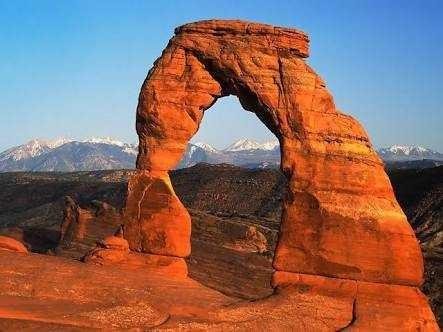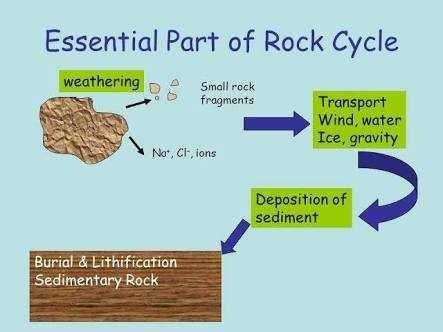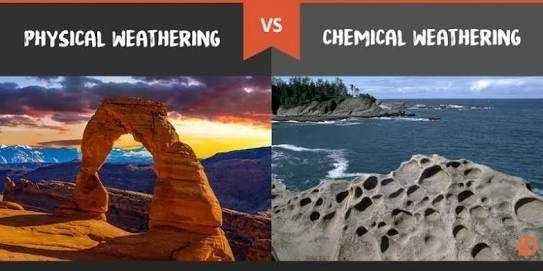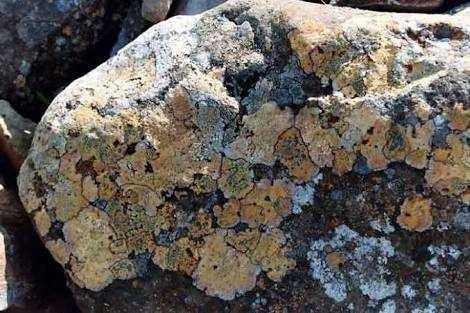Weathering works to destroy rock and become ground?
There are so many natural elements that must be known from the various solar planets we live in, stars, asteroids, to natural satellites. In addition to the solar system we have also learned about where we live, the planet earth. In addition to the earth there is also another planet that also makes the sun as its center. The planet surrounding the sun has different characteristics. Although the characteristics are different, but sometimes there are some elements of planet earth that is owned by other planets. One of the elements that many planets have and almost all of them are rocks.

Speaking of rocks, rock is one of the elements on earth that is very much. Rocks are even one of the constituent elements of the earth. Stone is one of the objects that have cycles. The cycle spins and will create a new stone. One stage of the rock cycle is weathering. Stone will be weathered and turned into soil.
Before we talk about rock weathering, we will know the meaning of weathering first. Then, what is weathering? Weathering is the mass destruction of rock mass, both physically, chemically, and biologically. Weathering can also be explained as the process of changing the composition and breaking of rocks or other materials occurring on the surface of the earth due to the processes of physics, chemistry, and biology.

This weathering is a natural process that works to destroy rocks into the soil. Another understanding of weathering is the process of altering the fragmentation of rocks and soil material near the surface of the earth caused by physical, chemical, and biological processes. This weathering process occurs in a very long time. In addition to being strongly influenced by time, weathering of these rocks is also influenced by various other factors. As:
Time
Factor that is very close and very synonymous with weathering events is time. Often people say that this weathering occurs because the rocks are too long or too old, until finally the rocks weathered. Even time is the first factor that can be used as the reason why weathering occurs.Type and structure
The next factor that affects rock weathering is the type of rock and its structure. We all know that rocks in this world have different kinds of rocks that are different from each other. Then about the structure of the rock, which is the physical and chemical properties possessed by the stone itself. The physical properties of rock include the color of the rock. While the chemical nature of the rock is a chemical element contained in the rock.Topography
The next factor that affects weathering is topography. Earth surface topography also affects the weathering process of rocks. Rocks on steep slopes tend to be more vulnerable to weathering than in sloping places. "This is because on steep slopes, rocks can be easily eroded by direct contact with the weather around the rock, but on sloped or flat slopes, rocks will be enveloped by various sediments, eventually slowing down the weathering process.Organism
The next factor that will affect the weathering process is the presence of organisms. The organism is quite important in the weathering process, as is the natural decomposition process of the plant.Climate and weather
Weather and climate elements that will affect the weathering process include air temperature, rainfall, sunlight, wind, and so on. In areas that have a humid climate and also heat, rocks will quickly experience the weathering process. In addition, the turn of the day and also the cold night will make the weather easier to happen, when compared with areas that have a cold climate.The state of vegetation
Vegetation also greatly affects the weathering process. This is because the roots of the plant can penetrate the crevices of the stone. As their roots grow larger, their strength will penetrate the rocks. In addition to the roots, fibrous leaves will also help accelerate rotting rocks. This is because waste rocks contain charcoal and humus acids that can damage the strength of the rock.
Here are some factors that can affect rock weathering. The existence of this factor will greatly affect the weathering of rocks that will eventually turn it into soil. In addition to the factors that affect, of course, will also be found some agents involved in this weathering process. Some agents that play a role in weathering include water, ice, salt, plants, animals and also temperature changes.

Weathering is the process of converting rocks into the soil naturally through chemical, physical or biological processes. This natural weathering consists of many different types. In general, this type of weathering consists of three kinds, namely physical, chemical, and biological weathering.
- Physical weathering
Physical weathering is a weathering often referred to as mechanical weathering. Physical weathering is a process of weathering rocks caused by the influence of physical factors on rocks. There are factors that play a major role in this weathering. The most dominant factors are air temperature, pressure, and also salt crystallization.
This physical weathering is also known as weathering due to temperature or climate change. This type of physical weathering can only be found in extreme climatic areas, such as sub-tropics, deserts, coastlines, and areas with steep topography.
Stone melapuknya in the desert area due to changes in daily extremes. High temperatures during the day will make the stone widen, then at night the temperature will go down and make the stone into the ground. Because this process takes place repeatedly will allow the mineral bonds in the rocks to weaken, so that eventually the stone will be destroyed into several parts.
Crystallization of brine that occurs in the rocks on the shore. salt crystallization that occurs in the pores of rocks around the coastal ecosystem will suppress the rocks in an endogenous way that will increase the chances of cracking rocks.
- Weathering Chemicals
Chemical weathering is a weathering process that occurs due to changes in chemical structures in the rock through certain reactions. In this chemical weathering, the reaction that occurs in the weathering process is divided into three kinds. Three kinds of reactions that occur in this chemical weathering include solution, hydrolysis, and oxidation.
a. Rainwater hydrolysis will lead to an increase in the acidity level around the rocks.
b. The oxidation that occurs in iron-rich mineral rocks will allow the mineral bonds on the rock surface to become weak and eventually flicker.
c. Lime dissolution process due to its reaction to water.

Speaking of chemical weathering, we will recognize four processes involved in chemical decay.
Hydration is a process that binds rocks on the surface only.
Hydrolysis is peroses decomposition of water on its elements into positive and negative ions.
Oxidation is a process of iron oxide.
Carbonation is the weathering of rocks caused by carbon dioxide.
The next type of weathering is biological weathering or organic weathering. Biological weathering is a kind of weathering of rocks carried out by organisms through its activities that surrounds the environment. In other words this biological weathering occurs because it is caused by living things.
This weathering occurs due to the role of certain organisms. As for the organisms that play a role in this weathering, such as animals, plants, fungi, bacteria, or even humans. This biological or organic weathering process involves two ways, namely biochemical and mechanical. Examples of biological or organic weathering include:
The presence of moss on the rocks. The growth of moss on the stone surface allows the stones to be degraded. Moisture on the rock surface due to root absorption with high pH around the surface of the rock will create corrosion of the rock surface.
That's some information about rock weathering. From the above description we know that rock weathering can occur in several different ways.

Note: All letters and numbers are mine, but the picture I got from google, I just use it to connect from my writing.
You just planted 0.02 tree(s)!
Thanks to @youngky
We have planted already 5967.44 trees
out of 1,000,000
Let's save and restore Abongphen Highland Forest
in Cameroonian village Kedjom-Keku!
Plant trees with @treeplanter and get paid for it!
My Steem Power = 20704.45
Thanks a lot!
@martin.mikes coordinator of @kedjom-keku
your photographs are mind blowing. perfect clicks like a professional photographer.
This post has received a 0.10 % upvote from @drotto thanks to: @youngky.
This post has received a 5.52% upvote from @msp-bidbot thanks to: @youngky. Delegate SP to this public bot and get paid daily: 50SP, 100SP, 250SP, 500SP, 1000SP, 5000SP Don't delegate so much that you have less than 50SP left on your account.
You got a 0.64% upvote from @mercurybot courtesy of @youngky!
You got a 1.11% upvote from @minnowvotes courtesy of @youngky!
You got a 1.46% upvote from @buildawhale courtesy of @youngky!
If you believe this post is spam or abuse, please report it to our Discord #abuse channel.
If you want to support our Curation Digest or our Spam & Abuse prevention efforts, please vote @themarkymark as witness.